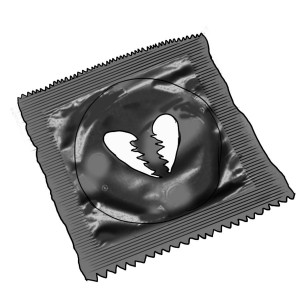If sex is a gamble, improve your odds
There are certain things we’re supposed to take risks with: playing the lottery, asking someone out or an “educated” multiple choice guess. Young adults often take risks with their sexual health as well, for better or worse outcomes. But the real risk comes when we don’t realize what we’re putting at stake.
Sex comes with physical and emotional risks. In many situations, it’s essentially a gamble dependent on how much you trust your partner or how much you prepare for the game of cards.
A gambler might be told to quit gambling to lower his or her risk of losing money, but what about individuals having sex? Should they quit too?
Not necessarily. Though abstinence is a sure-fire way to avoid sexually transmitted infections and pregnancy, there are other proven measures that people can take to lower their risk when having sex.
Condoms, for one, protect against HIV and most other sexually transmitted infections and pregnancy.
We even have vaccines for human papilloma virus, which is the most common STI in the United States. Half of all sexually active men and women will contract it at some point in their lives, although most individuals’ immune systems will fight off the virus before these symptoms emerge — one in two is pretty high odds.
The fact that it is the main cause of cervical cancer raises the stakes even higher.
Still, the perception that HPV is solely a women’s health issue leaves many men in the dark about their own chance of contracting and suffering from other consequences of HPV.
Last year, the Journal of Clinical Oncology found a 225 percent rise in HPV-linked head, neck and throat cancers between 1988 and 2004. The study authors attributed this rise to oral sex.
That same year, the Center for Disease Control recommended that physicians vaccinate boys aged 11 to 21 with the HPV vaccine, and up to age 26 if the patient asks. Even so, the vaccine doesn’t provide 100 percent protection against all the HPV strains. In addition to the vaccine, the good old-fashioned condom should be used against HPV and other STIs.
The CDC also recommends that females be vaccinated before they are 26. In addition, gynecological appointments for sexually active women can help detect HPV and cervical cancer.
Even responsible individuals can hardly protect themselves from risks they don’t know about, which is why it is important for people to take initiative to inform themselves about their sexual behavior and the possible health consequences. Condoms and other forms of birth control aren’t 100 percent protective, but they come pretty close when used correctly.
The bottom line: Sex is a gamble, but so are many other things in life. Be informed, know what you are willing to wager and take the proper actions to ensure you are pleased with the payoff.
Natalie Chau, Brooke Sanders and Lucas Griffin are peer health educators of the Office of Wellness and Health Promotion.


Comments are closed.